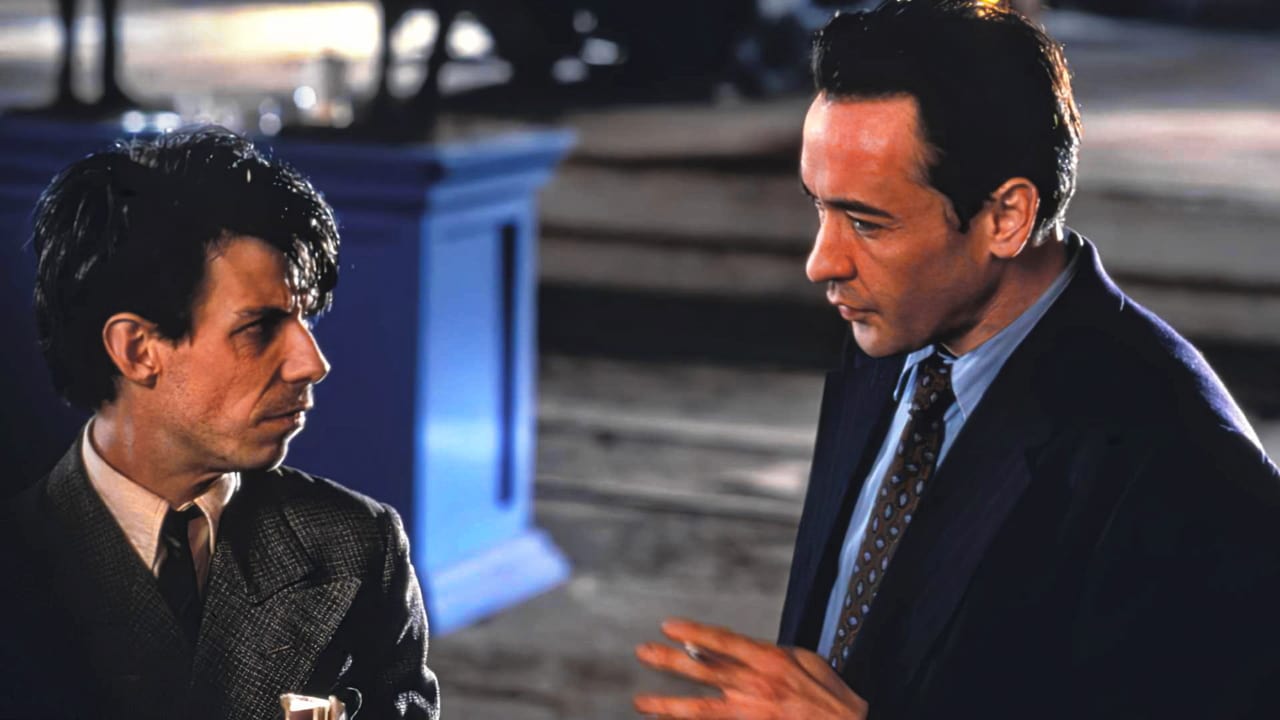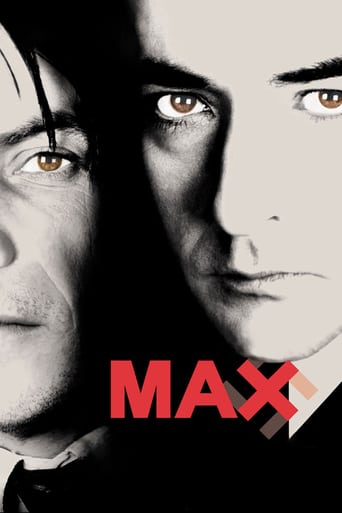

More often than not, as this film ground relentlessly forward, I found myself wondering just exactly what the point of it all was - at least, when I wasn't struggling to keep my eyes open. "Plodding" would be one way to describe the pacing of the movie, with "bewildering" being one way to sum up the plot. I suppose you could say that it traces some of the early development of Hitler's anti-semitism (which, like the plot, seems a bit muddled in this movie) but in general "Max" just seems grievously lacking in purpose and direction. The performances are its primary redeeming quality; with John Cusack as Max Rothman and Noah Taylor as the young Hitler both offering decent enough performances which helped make this watchable. The story is pure fiction, based on some obvious historical inaccuracies - the most obvious of which is that Hitler, as far as I know, wasn't much involved as an artist in 1918. His "artistic" period was pre-World War I in Vienna. That aside, the story depicts the cautious relationship between Hitler the artist as the War is coming to an end and Rothman the Jewish art dealer who becomes interested in Hitler's work and tries to encourage him to release his inner rage on canvass - which would have been a service to history and humanity. It's intriguing to the extent that Hitler did have some complicated relationships with Jews in his earlier years, including the Jewish family doctor who treated his dying mother and to whom Hitler gave protection after coming to power. And you do find yourself wondering what the world would be like today if Hitler had succeeded as an artist rather than in politics.Interesting - but in the end this movie is pure fantasy, with no basis in reality. Performances aside, I'll remember it (to the extent that I remember it at all) for its poor pace and weak storyline. (3/10)
... View MoreI found this attempt to recreate how the monster Hitler evolved during the period after WWI highly admirable: it has a great sense of period, contrasting the comfortable civilized life led by German Jews with those of other German citizens who after the humiliation of WWI were not so comfortable; John Cusack is perfectly cast in a witty, mature role, a man who should be bitter and cynical, but is saved by his education.The problem for me is Adolph--how can anyone play Hitler? Lots of great actors have attempted the task--Guinness, Richard Basehart, Anthony Hopkins, and for comedy Chaplin and Ionesco's favorite, Bobby Watson--but only one has captured the fiendish maniacal madness that the man must have had to induce mass hypnotism on a nation, to persuade civilized folks to exterminate another race, and that is Bruno Ganz in the splendid end-of-days drama Downfall, and we only meet him in the last doomed days of the Third Reich.Noah Taylor does his level best to meet the challenge of the developing messianic leader, and, in the course of the film, many excellent arguments about the nature of art are poised; but ultimately the film did not work for me because I'm not sure one can effectively portray Hitler--or Garbo--or Einstein--I'm sure you could make up your own list. The film is never dull, and except for a predictable last five minutes, thoughtful and provocative.
... View MoreThis film mirrors Hitler's own speaking style in the way it jumbles the truth, weaving fact with fiction in such a frustrating blur one can only respond to what it says by blurting emotional responses at the screen. In Ian Kershaw's exhaustive study "Hitler", and quite fully supported by the semi-autobiographical "Mein Kampf", we find that Hitler had already been a struggling artist (and had given it up) long before the outbreak of World War One, had a fully developed political agenda rife with anti-Semitism which was the Zeitgeist of the day(feeling of the times), and was hired by the military to give oratory in the public parks because of an already well developed talent for his anti-Jewish harangues. His talent for the diatribes was noted by the army because his comrades in the trenches had become sick of listening to the endless vitriol and had complained to higher-ups "that he wouldn't shut up". All the qualities that Hitler is portrayed by this film to have developed in some form of crisis while deciding between art or politics, this artistic flair for polemics, had already taken shape many years before. In "Mein Kampf", one reads from Hitler's own pen that the question of whether the Hasidic Jew he encountered "was a German" arose when he was in Vienna, which was about 10 years before the start of World War One. Curiously, Hitler himself was not a German either! There are many anachronisms in this film. One merely has to see a German military greatcoat of the era in a photograph to know that what Hitler was wearing was probably some Canadian military surplus of WWII. The rest of the costumes were very anachronistic as well, looking like the costume manager just rummaged through the neighborhood Sally Anne for old clothes. For instance, in 1918-1919, at formal gatherings people still wore top-hats. Hitler wore a top-hat to his inauguration in 1933! Collars were higher on the neck, sports coats had belts in the back at least, if not in the front too, and the leading edges of coats had round or tapered edges not square. The houses were decorated in a fashion not seen until Ikea came along, arc-welding, cars, and on and on. Some of the coarse language by Max's women friends can be seen to be out of place as well.Although all of these inaccuracies turn the film into a "what if" scenario, it still scores a few points with its implied assertion of Hitler's sexual dysfunction and the interesting proposition that if Hitler simply got laid at an earlier age his interests in life may have been diverted away from murder and imperious expansionism. But then again, he may simply have been a happily married despot. One tends to forget in these deep studies of Hitler's mind that it required an equally disturbed national psyche to follow him into the abyss that was Nazi Germany.When we examine Germans and the question of Nazi Germany with any truth, we see an advanced people much like ourselves, and so the examination should become one of introspection. People incorrectly try to pick apart the mind of Adolf Hitler looking to pin all the blame on a curious freak of nature, forgetting the influence of Nietzsche, and the thousands of anti-Semitic publications of the era. The moral, missed by the authors and so hard for the history re-writers to accept, is that we are all capable, given the correct circumstances, of becoming Nazis.
... View MoreI am surprised to have watched this movie not just once but thrice. I at first really did not care for it especially when it talked about Hitler when he was an aspiring artist. I was not too enthusiastic but having sit through it, I was quite fascinated. The movie shows how young Hitler was struggling to get noticed for his artwork and talk about angst that Noah Taylor shows as Adolf in not knowing where to pursue his talents, politics or art. My only complaint I have about this film, and nothing against John Cusack but I think he was miscasted in this movie. The reason why I say this is because most of the actors in this movie have a European accent not necessarily a German one. Mr. Cusack is the only one in this movie talking like an American with an American accent. Mr. Cusack does not attempt to use a European accent or anything to cover his American speak. I just felt that he was out of place in this movie with his American accent. For most people they may not care but I found it hard not to notice while everyone else around him sound different. I felt that Mr. Cusack just got off doing the CITY HALL movie and immediately got thrown in to this one. The idea of him being a German cavalry officer definitely took a leap of imagination with his straight American accent. Other than this detail, I did find the movie interesting. The director tries to show us young Hitler as a very troubled man who's artistic abilities are just ignored and this does not help to tame the intense hatred that Noah Taylor brings out very effectively. At times the viewer would think that Noah was possessed with Hitler's spirit when Noah starts to rant and rave to the audience. I must say that this film is not for the CRASH, BOOM, BAM action flick fans, but if history or pseudo-history interests you , then you might like it. I WILL SAY THAT THIS FILM MAY NOT BE HISTORICALY ACCURATE TO THE ACTUAL PORTRAYAL OF ADOLF Hitler. I think its more of a WHAT IF movie and as that it is quite enjoyable.
... View More